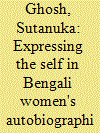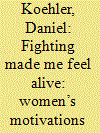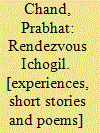|
|
|
Sort Order |
|
|
|
Items / Page
|
|
|
|
|
|
|
| Srl | Item |
| 1 |
ID:
097724


|
|
|
|
|
| Publication |
2010.
|
| Summary/Abstract |
This article discusses evidence from the autobiographical writings of three Bengali women to explore expressions of the self in such literature. Sarala Devi Chaudhurani, Santisudha Ghosh and Manikuntala Sen were contemporaries, all three active in different capacities in the various political formations that shaped the outcome of the struggle against colonial occupation. Their autobiographies lay bare the prescriptions they encountered as daughters and women and the choices they made, all the time straddling multiple worlds, occupying multiple subject positions.
The article contends that these autobiographies, along with other personal and public documents, reflect the construction of tortured, fractured female subjectivities that must continually negotiate with 'modernity' in early twentieth century Bengal. Consequently, the 'female self' in these autobiographies is not a securely rooted and stable entity but is constantly 'becoming', as the various fragments try to cohere around an elusive centre, 'modernity', which is itself a nebulous, unstable product of
|
|
|
|
|
|
|
|
|
|
|
|
|
|
|
|
| 2 |
ID:
191001


|
|
|
|
|
| Summary/Abstract |
Even though it is well documented that women have had, and continue to have, much more prominent positions and stronger participation in violent left-wing extremism and terrorism compared to other forms of political violence, the literature on their motivations to join militant left-wing milieus and groups is under-developed. Compared to female members of violent extreme right, jihadist, or ethno-separatist groups, little is known about the drivers involved in motivating women to join the violent far left. My study examines thirteen autobiographies of German and American women who were active in various forms of left-wing terrorism to shed light on their motivational themes for joining those militant groups. The analysis identified four key motivational themes across the autobiographical materials: living a completely authentic life as political warriors (consequentialism), being part of a global rebellion (internationalism), moral superiority of the cause, and responding to intolerable prison conditions caused by illegitimate governmental force or police brutality. The findings highlight the importance of understanding women’s involvement in terrorism through their own complex decisions and agency.
|
|
|
|
|
|
|
|
|
|
|
|
|
|
|
|
| 3 |
ID:
029647


|
|
|
|
|
| Publication |
New Delhi, S. Chand & co., 1967.
|
| Description |
192p.Hbk
|
|
|
|
|
|
|
|
|
|
|
|
Copies: C:1/I:0,R:0,Q:0
Circulation
| Accession# | Call# | Current Location | Status | Policy | Location |
| 000916 | 923.554/CHA 000916 | Main | On Shelf | General | |
|
|
|
|
| 4 |
ID:
188104


|
|
|
|
|
| Summary/Abstract |
This article is a qualitative study of anti-IS fighters who have traveled from the West to join the military struggle in Syria and Iraq. while earlier studies have mainly analyzed open sources (i.e. social media or journalist’s reports), this article is based on an in-depth analysis of eight autobiographies written by individuals who traveled from Sweden, Norway, Denmark, the United Kingdom, Germany and the U.S. to take part in the fight against IS. What motives do they give for doing so, how are they treated by the police and journalists after they return from the wars in Syria and Iraq, and do they express other motives than those given by Westerners who have joined IS?
|
|
|
|
|
|
|
|
|
|
|
|
|
|
|
|
|
|
|
|
|